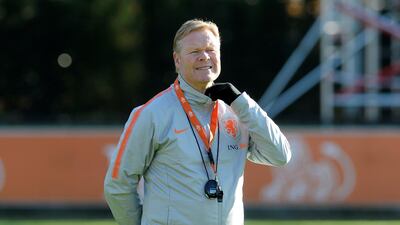Ronald Koeman was still at Everton when he told the Catalan newspaper Sport that he had two dreams left to fulfil in football: managing Holland and Barcelona.
In a damage-limitation exercise, Koeman then claimed he would not break his contract at Goodison Park. Everton instead ripped it up a few months later after a dreadful run of form. Three years on, Koeman is on the brink of realising both unlikely dreams.
He has revived his country’s fortunes. Now for his favourite club’s. It marks a remarkable renaissance. Koeman seems part of trends, where elite clubs appoint former players even when managers who are outsiders boast better CVs and where Barcelona in particular often overlook those who, objectively speaking, are the best in the business, and distinct from them.
Koeman rarely hid his interest in Barcelona during his time at Southampton and Everton. There was the sense he felt he was bigger than his employers and, in a way, he was. And yet the paradox is that the man who delivered Barcelona’s first European Cup with his 1992 free kick is not a true believer of the La Masia school of thought.
He is the Barcelona legend who doesn’t play tiki-taka, the Johan Cruyff disciple and former Pep Guardiola roommate whose brand of football is more pragmatic than those of his mentor and close friend.
Indeed, Koeman indirectly ended the era of global superiority that stemmed from Catalonia. His 3-5-2 formation with Feyenoord prompted Louis van Gaal to borrow the formation for a counter-attacking Dutch team who thrashed Spain 5-1 in the 2014 World Cup.
His Southampton side could be direct, playing more to the target man Graziano Pelle’s strengths than the wingers Sadio Mane’s and Dusan Tadic’s. In three full seasons in England, his teams never averaged more than 51.9 per cent of possession.
Maybe Barcelona need less idealism and more realism now many of those who espoused an ethos, like Xavi and Andres Iniesta, have left. Certainly the side thrashed by Bayern Munich could do with the defensive resolve Koeman lent Southampton, who conceded under a goal a game in his reign.
__________________
Barcelona 2 Bayern Munich 8 in pictures
__________________
Some of Koeman’s credibility comes from his past, even if it is distant. While he revived Holland, taking them to the Nations League final and beating Germany 4-2 in Hamburg in Euro 2020 qualifying, his last trophy came 12 years ago: before, indeed, Guardiola took charge.
Some of it comes from his character. Koeman could never be accused of modesty and he won’t be intimidated by the task. Unlike Quique Setien, the luckless overpromoted mediocrity, he is a major footballing figure.
And yet Barcelona will be replacing a manager whose last game was an 8-2 defeat with one whose last club match was a 5-2 defeat. Nor can Barcelona, whose recruitment has been wretched in recent years, take much solace from Koeman’s record in 2017, when Everton contrived to confuse themselves by acquiring three No 10s.
Barcelona may take more encouragement from his spell in charge of his country. Then as now, he inherited a footballing institution at a historically low ebb. Holland had failed to qualify for Euro 2016 or the 2018 World Cup. Yet, and while Frenkie de Jong is a common denominator in both jobs and a player who ought to improve on a difficult first year in Catalonia once Koeman is in charge, there is a fundamental difference in his inheritance.
Holland had an emerging generation of talents. Barcelona have a declining generation of greats, backed up by ill-advised buys. Koeman is a throwback to some of Barcelona’s finest days but he is bequeathed a mess. The Dream Team’s goalscoring defender will see if his dream becomes a nightmare.



















